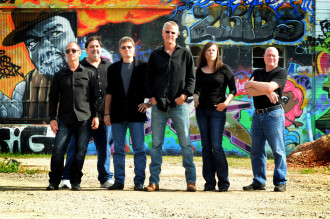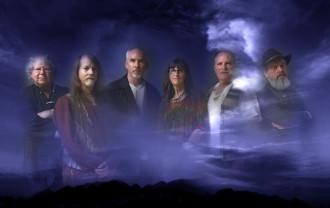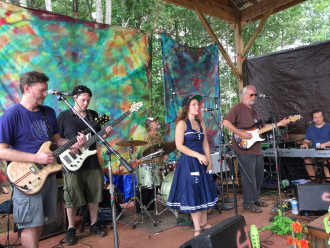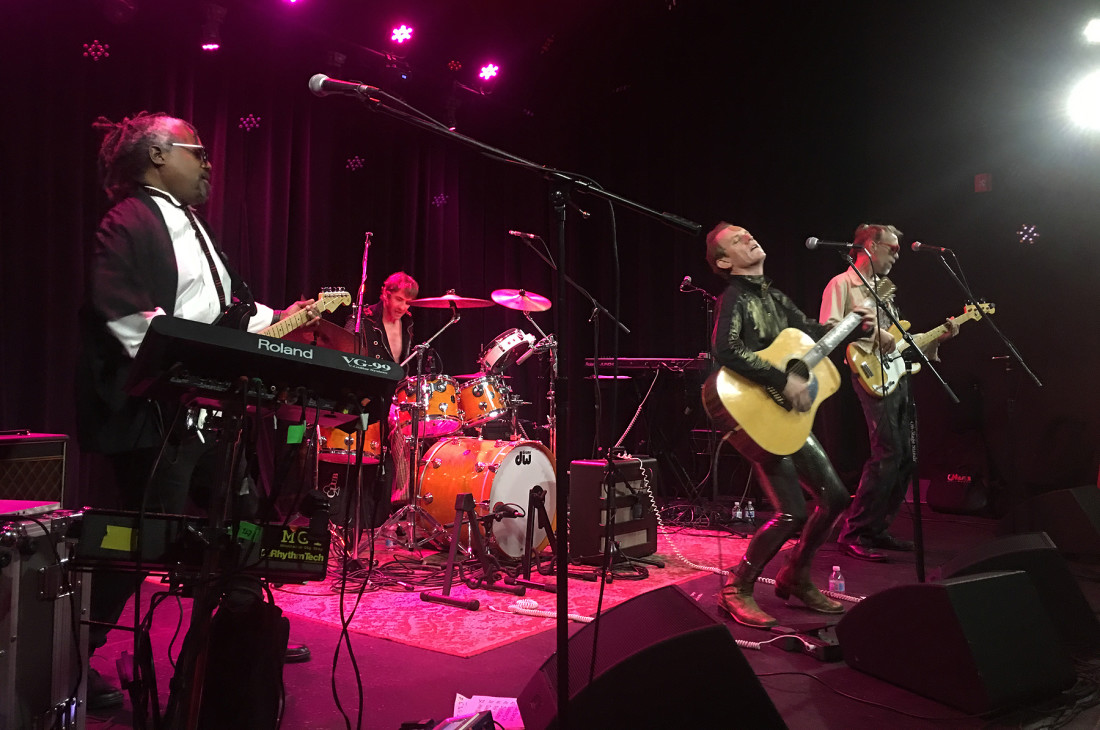The Asheville music scene, though known for its range of original work, has kept a special place in its heart for tribute acts. More than 13 years ago, a young quartet of high-school-age musicians played a sound-alike set of Beatles classics at Bele Chere. Though they couldn’t have known it at the time, the members of Yesterday’s Tomorrow were the vanguard of a vital mini-scene.
The sonic spectrum
There are varying degrees of musical tribute: Some groups look — or at least costume themselves — like the original artists and painstakingly reproduce every trademark stage move. Others simply focus on exploring the music. Bill C. Evans, guitarist for Phuncle Sam (one of Asheville’s longest-running tribute groups), says when his group pays homage to the Grateful Dead, “it’s not like Beatlemania. Grateful Dead music leaves lots of room for improvisation. [The] songs have basic structures, but within them, there are always opportunities to be different.”

At the other end of the sonic spectrum lies one of the area’s newest tribute groups, The Lost Chord. Led by guitarist Sherman Hoover, the sextet goes to great lengths to re-create the sound of the Moody Blues’ classic era, 1967-72. Hoover points out that duplicating the British group’s rich, symphonic pop ambience is a challenge. “I don’t think it could be pulled off with only five people,” he says.
And, in between those two bands’ approaches, is David Bowie tribute act Wham Bam Bowie Band, led by vocal dead-ringer Mark Casson. The band – featuring Asheville musicians including guitarist André Cholmondeley, drummer Jim Neu and multi-instrumentalist Aaron Price – also “stay[s] as close as possible to the [original] recordings,” Casson says. But the WBBB’s approach leaves plenty of room for the individual musicians to express themselves. Casson notes that Cholmondeley — who also leads Frank Zappa homage Project/Object — “synthesizes sounds through his guitar. He’s able to handle a lot of the quirky stuff, including saxophone parts.”
Less musically demanding — but no less beloved among music fans — is the body of work created by guitarist-songwriter Tom Petty. The Gainesville. Fla.-born artist passed away unexpectedly in October, but Asheville-based tribute band Somewhat Petty had already been playing his music around town for several months. Guitarist and leader Damon Goldman says Petty’s music is “timeless and well-crafted. It’s not complex, but it’s well-executed, and there are so many things [in Petty’s lyrics] that are relatable for the audience.”
All four bands play locally, and Wham Bam Bowie Band occasionally takes to the road. Speaking of touring, a steady stream of high-profile homage acts makes Asheville a regular destination. Most, such as Abbey Road Live (Beatles tribute), Rumours (Fleetwood Mac), Who’s Bad (Michael Jackson), Zoso (Led Zeppelin), Badfish (Sublime) and Nevermind (Nirvana) land at The Orange Peel.
“Although our main mission is to present original artists, we find there is still demand for tributes,” says The Orange Peel’s manager, Jeff Santiago. “Turns out many of us are nostalgic.”
Setting the bar
In 2008, Damon Goldman moved his family from Florida to France. Because the move was only temporary, nearly all of the Goldmans’ possessions were in storage. The house where they stayed had a CD player with only three discs in it. One of them was Petty’s 1993 Greatest Hits collection. “For three months, that’s all I listened to,” he says. “And what’s really funny is that I never got tired of it.”

Goldman formed Somewhat Petty in late 2016. Wham Bam Bowie Band drummer Neu (who also plays in Who tribute band the Wholigans) had encouraged Goldman to start the group after hearing him sing some of Petty’s tunes. “Your voice is very similar to Tom’s,” Neu told Goldman, “and I think it would be a good fit.”
The six-piece group found that its profile was raised after Petty’s death, but the band isn’t capitalizing on that fact, focusing on dates close to home. Goldman’s goals remain modest. “We chose the name Somewhat Petty as a way of not setting the bar too high,” he says with a chuckle.
The Lost Chord has a bit more of a challenge. The Moody Blues’ most enduring material is found on seven albums beginning with Days of Future Passed. It’s upon that period that The Lost Chord focuses. The studio versions of the Moodies’ densely layered songs often feature multiple acoustic guitars, several keyboards, flute and tambourine, in addition to standard rock band instrumentation.
But even when re-creating those sounds, the members of the Lost Chord can stretch out … a little. “There are cases where we have to come up with a live ending,” Hoover says, “because [on the records] a lot of songs just fade out.”
Hoover believes that part of the appeal of the Moody Blues’ music comes from its character. “They’re ‘prog’ rock and psychedelic rock rolled up into one,” he says. “And they have a lot of mystical and spiritual messages in their lyrics.”
The Lost Chord reinforces those ingredients through deft use of video-screen effects onstage. “That gives people something more to look at than just us,” he says. “It’s more interesting than just having colored lights.”
One more Saturday night

For the deepest immersion in the psychedelic music experience, one need look no further than the Grateful Dead. Few groups have enjoyed a more fervent and dedicated fan base than the San Francisco group, which officially ceased operations in 1995. By 2003, Phuncle Sam began playing the Grateful Dead’s music locally — it’s earliest regular gig was Dead Night. “For a while, we did it once a month,” Evans says. “And then we did it once a week for a little while.”
The band’s appeal was initially a bit narrow. “People at the clubs in town really did not want to know about the Grateful Dead,” Evans says. That gradually changed, as Phuncle Sam built a loyal fan base. February will mark the six-year anniversary of Phuncle Sam’s weekly acoustic offshoot, the Free Dead Friday performance series.
The band claims a repertoire in excess of 200 songs, and the jazz aesthetic of the Dead’s material — with a focus on improvisation — means that audiences never see or hear the same show twice. That’s a remarkable feat for Phuncle Sam, a band that has played several hundred shows since its inception.
Wham Bam Bowie Band also has the advantage of a widely varying body of work from which to choose. Ever the restless musical chameleon, Bowie worked in glam rock, soul, krautrock and many other styles. Despite WBBB’s excellence in re-creating the music — the musicians have played entire Bowie albums and are now working on one of the most challenging, 1973’s Aladdin Sane — Casson remains modest. “What we do is more like an interpretation than an impersonation,” he says.
Singing and playing in homage to another’s work isn’t the same as performing one’s own original music, but for the members of these local groups, playing in a tribute band scratches a musical itch all its own. “To me,” says Goldman, “a tribute group is paying respect to the person or band that created the music.” And, in the process, they’re bringing joy and entertainment to local music fans.
Correction: the print version of this story incorrectly names Somewhat Petty’s guitarist Damon Goldman. The author regrets the error.






Been DYING to get a good Floyd Tribute going in AVL but cannot find people of like minds to do it.
Here’s some links:
https://youtu.be/Q_YBCCTLZ00
https://youtu.be/DEZHt-l1IFU?t=22s
https://www.youtube.com/watch?v=vwH2sa1HKoI
https://soundcloud.com/wth_worship/shine-on-hiwatt-dr504-clone
The author of this story happens to be a vocalist/keyboardist and a Pink Floyd fanatic. Maybe we should talk.
http://reinventingpinkfloyd.com
Definitely. The Richard Wright piece was the next to add. Skins and Bass are pretty straightforward.
I’m thinking of pulling together a kickass Blood Pollution tribute band. Their Steel Dragon covers were the best. Who’s bloody with me?